| Srl | Item |
| 1 |
ID:
124248
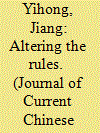

|
|
|
|
|
| Publication |
2013.
|
| Summary/Abstract |
This study looks at Chinese homeowners' participation in policymaking. Drawing on evidence from Guangzhou and Beijing, it shows that various organised homeowner activists have moved upstream in the policy process and have begun to push beyond policy implementation into the domain of agenda setting and "rule-making". These advocates display rights-conscious patterns of behaviour that are closer to that of interest or lobby groups than to the typical repertoire of Chinese contentious citizens. The study suggests that this kind of political participation is on the rise amongst Chinese homeowner activists. This result complements and extends other recent findings that suggest the Chinese policy process is gradually opening up. Such a trend could have significant implications and calls for more research in different domains of state-society relations.
|
|
|
|
|
|
|
|
|
|
|
|
|
|
|
|
| 2 |
ID:
124245
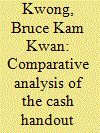

|
|
|
|
|
| Publication |
2013.
|
| Summary/Abstract |
In 2011, Hong Kong SAR government announced an unprecedented policy of cash handouts of 6,000 HKD to all permanent residents at the age of 18 or above as a means of defusing public discontent with economic policy and poor governance. Macau SAR has also been distributing similar cash handouts since 2008 to temper public dissatisfaction and widespread demonstrations. Initially, both SAR governments were very reluctant to initiate universal cash handouts. Unlike standard welfare programmes that are budgeted for annually, the cash payment scheme in Hong Kong SAR was a one-off handout. In Macau SAR, however, the payment scheme went from being a short-term policy to a long-term policy, while other welfare programmes were also allocated more public money. This paper argues that although such cash handout policies are avoidable, they are still being adopted by politicians who place self-interest above the public interest.
|
|
|
|
|
|
|
|
|
|
|
|
|
|
|
|
| 3 |
ID:
124246
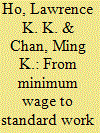

|
|
|
|
|
| Publication |
2013.
|
| Summary/Abstract |
This paper aims to highlight the significance of labour issues - namely, the minimum wage (MW) and standard working hours (SWH) - in shaping candidates' electoral platforms in the 2012 chief executive (CE) election of the Hong Kong Special Administrative Region (HKSAR) under the sovereignty of the People's Republic of China (PRC). We first offer a brief review of labour politics regarding the MW case as a precursor to the SWH drafting and enactment process. We then provide an analytical delineation of some of the labour and socio-economic dimensions of the CE electoral contest by comparing the candidates' campaign planks in relation to SWH. We then attempt to predict the likely course of the SWH debate under the leadership of Leung Chun-ying, who eventually won the CE election and assumed power on 1 July 2012. We conclude by examining Leung's social engineering attempts to increase popular support amongst low- and middle-income (LMI) households as part of his long-term strategy for the 2017 CE elections and his broader Beijing-entrusted political agenda.
|
|
|
|
|
|
|
|
|
|
|
|
|
|
|
|
| 4 |
ID:
124243
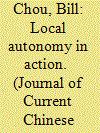

|
|
|
|
|
| Publication |
2013.
|
| Summary/Abstract |
This paper investigates how Beijing governs its two special administrative regions (SARs) of Hong Kong and Macau through leverages on their local autonomy. First, a conceptual analysis of local autonomy will be provided. Local autonomy is more than a zero-sum game between the central and local authorities over how much power should be granted or taken from the local authorities; it also concerns the space for cultural expression and the use of local customs in public administration. Second, the degree of local autonomy in Hong Kong and Macau will be critically examined. On paper, both SAR governments are able to freely make decisions on a wide range of policies. In practice, however, Beijing has the absolute authority to override the decisions of Hong Kong and Macau. It is argued that the autonomy in cultural expression can compensate for the institutional constraints on the two SARs' decision- making power and is thus able to alleviate public discontent - as long as the constraints do not conflict with the people's core values and ways of life.
|
|
|
|
|
|
|
|
|
|
|
|
|
|
|
|
| 5 |
ID:
124247
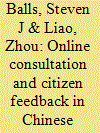

|
|
|
|
|
| Publication |
2013.
|
| Summary/Abstract |
In recent years, the Chinese government has increasingly utilized online consultation as a means of providing citizens with opportunities to offer feedback on draft laws and regulations. As little is known about the operation of online consultation, this article analyses the content of citizen feedback submitted on a revision to China's health system proposed by the National Development and Reform Commission. Citizen engagement with the political and substantive issues under consideration is crucial if online consultation is to impact government decision-making and enhance the performance of laws and regulations. This paper's main findings are that it was common for comments to address substantive issues in great depth, as well as express negative assessments of government decisions. This suggests that online consultation holds promise as an instrument of governance reform, which the Chinese Communist Party has embraced as a means of cultivating popular support.
|
|
|
|
|
|
|
|
|
|
|
|
|
|
|
|
| 6 |
ID:
124249


|
|
|
|
|
| Publication |
2013.
|
| Summary/Abstract |
This article surveys the complex ecumenical, missionary and international church relations of Chinese Protestant Christians. It argues that the inter-church relations to other parts of Asia are overshadowed by relations to Christians in the West, thus reflecting a political preoccupation with relationships to the West. This is evidenced by an analysis of worldwide and Asian ecumenism as well as bilateral church and missionary relationships. The dominance of contacts with the West not only contradicts the idea of a multipolar world and increased South-South contacts, it also stands in contrast to the reality of growing and increasingly important Christianity in Asia. Methodologically, this paper analyses different kinds of international relations (multilateral and bilateral, inter-church and missionary) and develops a typology of different interchurch and inter-state relations to assess international church relations in sia today. The typology shows how China's international church relations support its political relationships with its neighbours and beyond.
|
|
|
|
|
|
|
|
|
|
|
|
|
|
|
|
| 7 |
ID:
124241
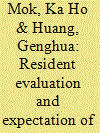

|
|
|
|
|
| Publication |
2013.
|
| Summary/Abstract |
China's welfare system is a typical “residual welfare regime”, which did not manifest too many flaws in the planned economy era. However, economic reform and market-oriented transformations in recent decades have shaken the original well-balanced “residual” and “needs” pattern. The decline of the “work unit system” has led to two consequences: First, it radically transformed the social and economic structures, which gave rise to increased and diversified needs of social welfare. Second, the government is being pressed to shoulder more responsibility for social welfare provisions. This article adopts a case study approach to examine changing social welfare needs and expectations in Guangzhou, a relatively developed city in southern China. With particular focus on the major trategies adopted by the Guangzhou government in addressing people's welfare needs, this article critically examines how far the new measures have met the changing welfare expectations of citizens in mainland China.
|
|
|
|
|
|
|
|
|
|
|
|
|
|
|
|